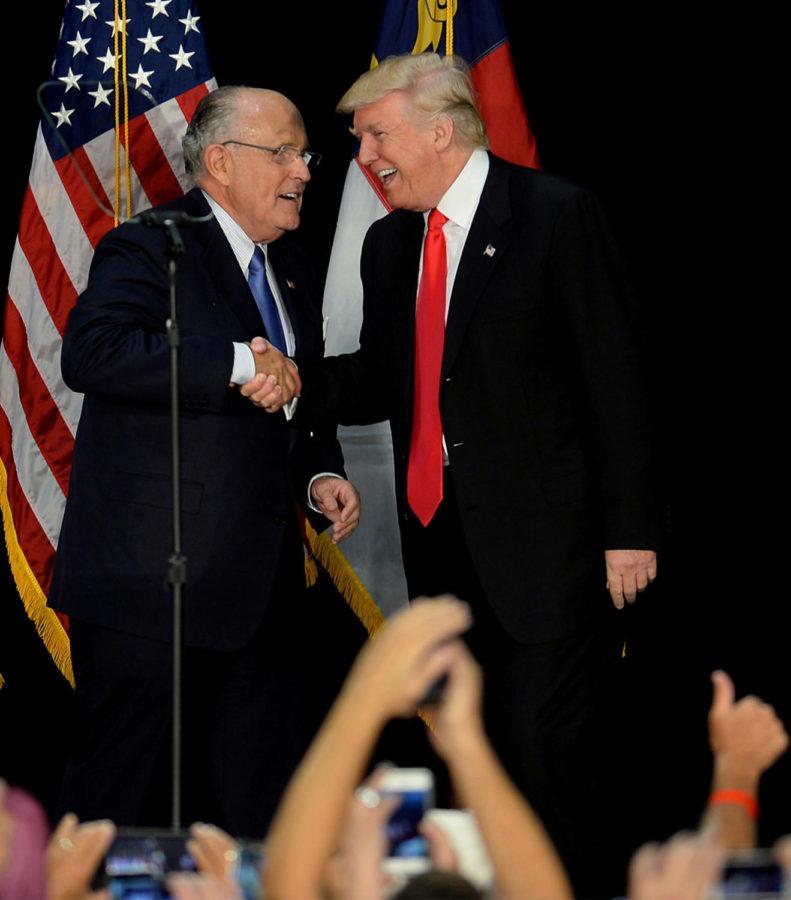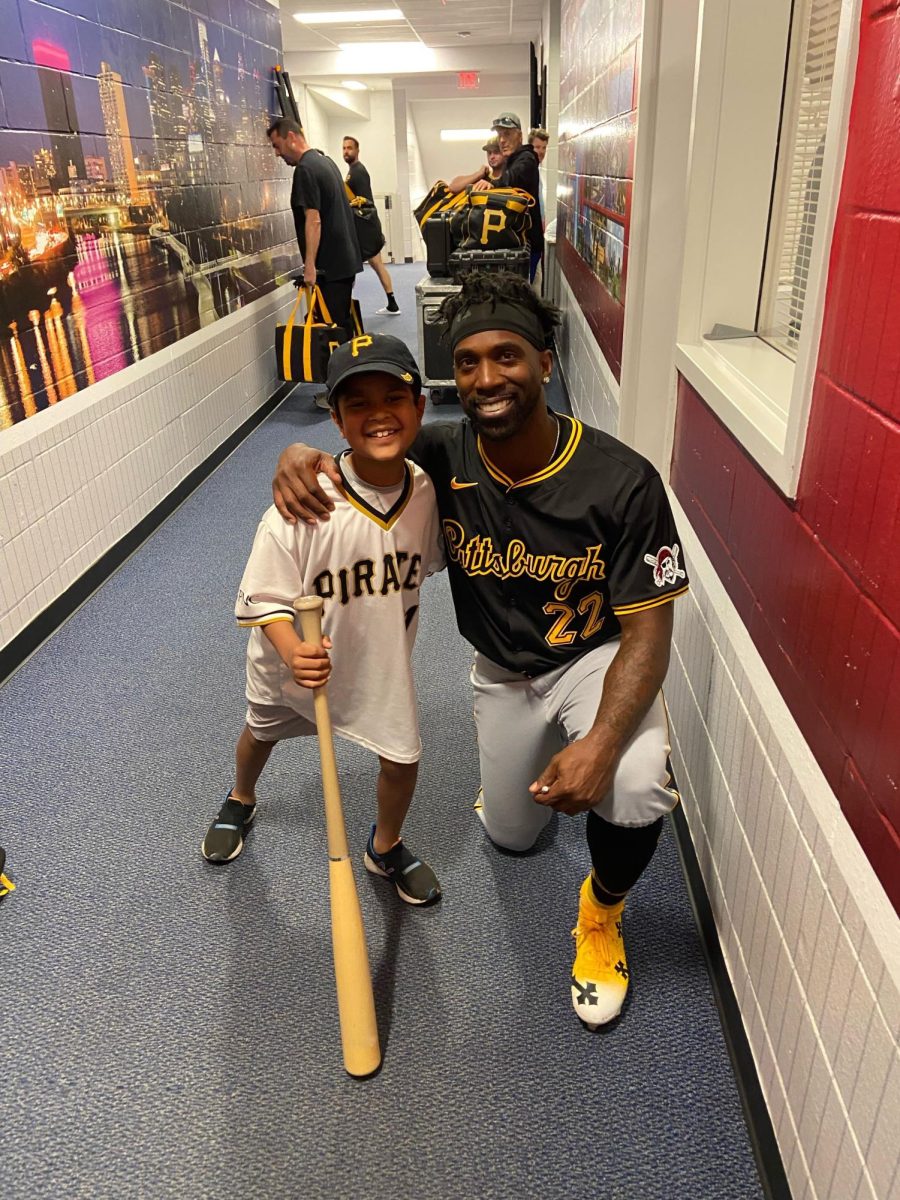Giuliani compounds Trump’s Russia woes in conflicting interviews
Jeff Siner/Charlotte Observer/TNS
Former New York City mayor Rudy Giuliani, left, welcomes Republican presidential candidate Donald Trump on stage during a campaign rally on Aug. 18, 2016, at the Charlotte Convention Center in Charlotte, N.C.
January 22, 2019
A lawyer’s job is to make a client look innocent, if not to prove it _ something President Donald Trump’s lawyer Rudy Giuliani has been struggling with in recent days. In a string of interviews, Giuliani has walked back a series of potentially damaging statements where he implied there were tapes of his client discussing plans for a Trump tower in Moscow, that Trump was discussing the Moscow project right up until the election and that he didn’t know whether anyone on the Trump campaign had colluded with Russia.
It’s been a particularly bad stretch for Giuliani, who from the start has given disorienting media interviews that created negative headlines and provided ammunition to Trump’s critics.
The former New York City mayor was added to Trump’s legal team last April to provide something Trump felt he was in need of _ a trusted ally who would forcefully make his case in public. His first mission was to sow doubt about the credibility of Special Counsel Robert Mueller’s investigation.
But Giuliani’s flair for making perplexing statements is now backfiring on his own client, creating more uncertainty about Trump’s innocence.
One major handicap for Giuliani is that he and Trump’s other lawyers have significant blind spots about what Mueller is uncovering in his continuing investigation into Russia’s interference in the 2016 election.
Trump doesn’t text or use email, meaning his lawyers must rely on the president’s own recollections. They also don’t have access to the personal communications and financial records of Trump’s associates.
Giuliani also wasn’t Trump’s first choice as the public face of his defense. The president was rebuffed by several well-known attorneys and his first lead lawyer John Dowd quit. But Giuliani brought a level of celebrity and credibility for many Americans who knew him as America’s mayor following the Sept. 11, 2001, terrorist attacks.
Last summer, Giuliani made a calculated choice to sow confusion and doubt about Mueller, with the intention of undercutting whatever the special counsel put in his final report.
Current Justice Department guidelines say a sitting president can’t be indicted, so Trump’s lawyers have decided that his greatest risk would be impeachment by Congress. Confusion and doubt among the public about the investigation was viewed as an asset for Trump’s defense.
But his recent interviews have sometimes backfired. His remarks to the New Yorker, published late Monday, took attention away from a topic Trump and his allies would like to be talking about _ Mueller’s unusual public denial of an article by BuzzFeed News that implied Trump told his ex-fixer, Michael Cohen, to lie in his congressional testimony.
Giuliani told The New Yorker that he knew the BuzzFeed story was wrong because “I have been through all the tapes, I have been through all the texts, I have been through all the e-mails, and I knew none existed.”
The BuzzFeed story made no mention of tapes, prompting the reporter to ask what tapes Giuliani was referring to. Giuliani then replied, “I shouldn’t have said tapes.” When the reporter sought to clarify, Giuliani said there were tapes, but not about this. “No tapes. Well, I have listened to tapes, but none of them concern this.”
Giuliani appears to be referring to tape recordings made by Cohen that were seized by prosecutors, but he left open the question of whether there may be other recordings. In a Sunday interview on NBC’s “Meet the Press” Giuliani contradicted claims Trump had repeatedly made about having no business with Russia during the campaign by saying Trump may have been involved in discussions about a Trump tower in Russia up to Election Day.
Cohen, who first told Congress that the Moscow talks ended in January 2016, later said in a sworn statement to Mueller that they actually ended in June. Giuliani’s suggestion they might have continued into November raises additional questions about what, exactly, Trump may have been up to.
On Sunday, Giuliani told The New York Times that Trump told him “discussions were going on from the day I announced to the day I won.” Giuliani later denied ever saying that to the Times.
Last week, Giuliani said the president never colluded with Russia during the 2016 campaign, But he also denied ever saying that no one on the campaign did so, appearing to contradict his client’s past statements. Trump has repeatedly used the phrase “no collusion” on Twitter and in media interviews in denying his campaign was involved with any Russian meddling in the U.S. presidential election.
In a statement the next day, Giuliani said his comments have been “misinterpreted.” “I represent only President Trump, not the Trump campaign,” he said. “There was no collusion by President Trump in any way, shape or form. Likewise, I have no knowledge of any collusion by any of the thousands of people who worked on the campaign.”
In his latest interview with The New Yorker, Giuliani suggested he was aware of the public perception he seems to be creating.
“I am afraid it will be on my gravestone. ‘Rudy Giuliani: He lied for Trump.’ Somehow, I don’t think that will be it,” he said. “But, if it is, so what do I care? I’ll be dead. I figure I can explain it to St. Peter.”








